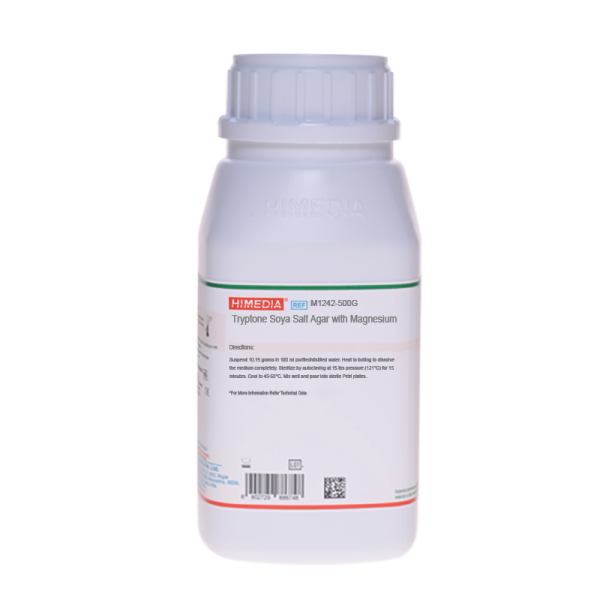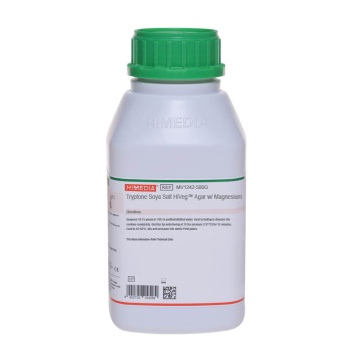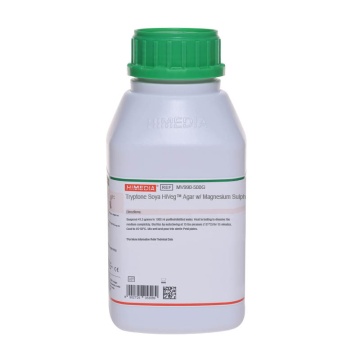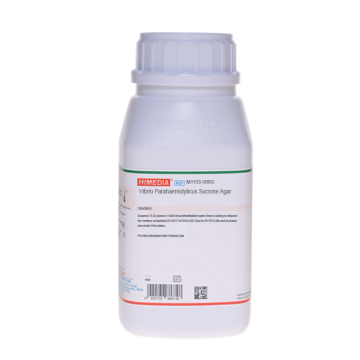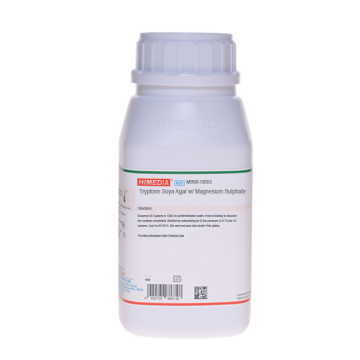 Your enquiry has been submitted
Your enquiry has been submitted
Tryptone Soya Salt Agar w/ Magnesium Sulphate
Tryptone Soya Salt Agar with Magnesium Sulphate is recommended for enumeration of Vibrio parahaemolyticus from seafood by membrane filter technique.
Composition**
| Ingredients | Gms/Litre |
|---|---|
| Casein enzymic hydrolysate | 50.000 |
| Papaic digest of soyabean meal | 5.000 |
| Sodium chloride | 30.000 |
| Magnesium sulphate | 1.500 |
| Agar | 15.000 |
Final pH (at 25°C): 7.3±0.2
**Formula adjusted, standardized to suit performance parameters
Directions
Suspend 10.15 grams in 100 ml distilled water. Heat to boiling to dissolve the medium completely. Sterilize by autoclaving at 15 lbs pressure (121°C) for 15 minutes. Mix well and pour into sterile Petri plates.
Principle And Interpretation
Vibrio's are fairly easy to isolate from both clinical and environmental materials, though some species may require growth factors and/or vitamins. Vibrio parahaemolyticus is the leading cause of bacterial diarrhoea associated with the consumption of contaminated food products. Media can be made selective for Vibrios by adding appropriate selective agents (1). High concentrations of sodium chloride have been used to select certain Vibrio species, based on the ability of most Vibrio's to grow at 3% or higher concentrations of NaCl. Tryptone Soya Salt Agar with Magnesium Sulphate (TSAMS) is recommended by APHA (2) for enumerating V.parahaemolyticus from seafood by membrane filter technique.
Casein enzymic hydrolysate and papaic digest of soyabean meal provide the nitrogenous compounds and other growth factors for the growth of V.parahaemolyticus The medium contains high salt concentration to meet requirement of Vibrio species from seafood.
The medium is used after the seafood sample is diluted (1:10) with sterile Peptone Tween Salt Diluent (PTS), blended for 60 sec at high speed and filtered through Hydrophobic Grid Membrane Filter (HGMF) (3). With forceps, aseptically transfer the HGMF from the filtration apparatus to the surface of a dry Tryptone Soya Salt Agar with Magnesium Sulphate and incubate. Following incubation for 4 hours at 35°C, HGMF is aseptically transferred from TSAMS to the surface of dry Vibrio Parahaemolyticus Sucrose Agar (VPSA, M1153). Following incubation, V.parahaemolyticus colonies on VPSA will be blue- green coloured since they are sucrose non-fermenters, and other growth will be yellow (2). Count green-blue colonies and calculate the MPN per gram of seafood.
Quality Control
Appearance: Cream to yellow homogeneous free flowing powder
Gelling: Firm, comparable with 1.5% Agar gel
Colour and Clarity of prepared medium: Yellow coloured clear to slightly opalescent gel forms in Petri plates.
Reaction: Reaction of 10.15% w/v aqueous solution at 25°C. pH: 7.3±0.2
pH: 7.10-7.50
Cultural Response
M1242: Cultural characteristics observed after an incubation at 42°C for 18-24 hours.
| Organism | Inoculum (CFU) | Growth | Recovery |
|---|---|---|---|
| Vibrio alginolyticus ATCC 17749 | 50-100 | good-luxuriant | >=50% |
| Vibrio parahaemolyticus ATCC 17802 | 50-100 | good-luxuriant | >=50% |
| Vibrio vulnificus ATCC 29306 | 50-100 | good-luxuriant | >=50% |
Storage and Shelf Life
Store below 30°C in tightly closed container and the prepared medium at 2 - 8°C. Use before expiry date on the label.
Reference
- Bruno Gomez-Gil and Ana Roque, Isolation, Enumeration and Preservation of the Vibrionaceae. F. L. Thompson, B. Austin and J. Swings. The Biology of Vibrios. ASM press.
- Vanderzant C. and Splittstoesser D. F., (Eds.), 1992, Compendium of Methods for the Microbiological Examination of Foods, 3rd Ed., APHA, Washington, D.C.
- Entis P. and Boleszczuk P., 1983, J. Food Prot., 46:783.
| Product Name | Tryptone Soya Salt Agar w/ Magnesium Sulphate |
|---|---|
| SKU | M1242 |
| Product Type | Regular |
| Physical Form | Powder |
| Origin | Animal |
| Packaging type | HDPE |
| References | 1. Bruno Gomez-Gil and Ana Roque, Isolation, Enumeration and Preservation of the Vibrionaceae. F. L. Thompson, B. Austin and J. Swings. The Biology of Vibrios. ASM press. |
| Customized Product Available | No |



